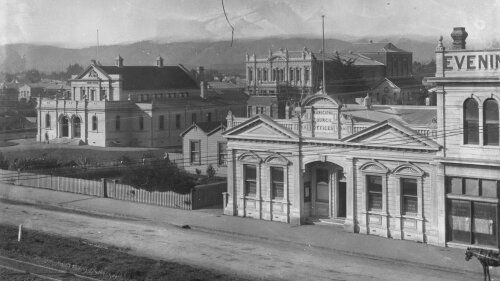Best Land Use & Zoning Lawyers in Palmerston North
Share your needs with us, get contacted by law firms.
Free. Takes 2 min.
Free Guide to Hiring a Real Estate Lawyer
List of the best lawyers in Palmerston North, New Zealand
About Land Use & Zoning Law in Palmerston North, New Zealand
Land use and zoning law in Palmerston North governs how land and property are used, developed, and protected within the city. These laws exist to ensure organised growth, protect the environment, support economic development, and maintain the character of local communities. The main regulatory framework comes from the Resource Management Act 1991 (RMA) and the Palmerston North District Plan, which set out the rules and policies for residential, commercial, industrial, rural, and green spaces within the region. Zoning determines what activities can or cannot occur on a piece of land, and landowners must comply with these designations when seeking to build, subdivide, or change the use of their property.
Why You May Need a Lawyer
There are a variety of situations where residents, developers, and business owners in Palmerston North might require legal advice related to land use and zoning. Some of the most common reasons include:
- Applying for a resource consent to develop land or alter existing structures.
- Disputes over boundary lines, easements, or rights of way.
- Challenging the classification of zoning on your property.
- Navigating complex regulations around subdivision or land development.
- Appealing a decision made by Palmerston North City Council regarding planning or zoning matters.
- Dealing with enforcement actions or compliance notices for breach of zoning laws.
- Protecting your interests when neighbouring developments may affect your property.
- Understanding your obligations around heritage or environmentally sensitive land.
A lawyer experienced in this field can help you interpret local rules, prepare applications, negotiate with council or neighbours, and provide representation in legal proceedings.
Local Laws Overview
Land use and zoning in Palmerston North is primarily managed through the Palmerston North District Plan, which is developed under the requirements of the Resource Management Act 1991. The District Plan zones land into different categories such as residential, rural, commercial, industrial, and special purpose zones. Each zone has rules about what activities are permitted, restricted, or prohibited.
Key aspects include:
- Zoning Areas: These dictate the types of activities (e.g., housing, retail, industry) that are allowed in different parts of the city.
- Resource Consents: Some uses of land or proposed developments require council approval before proceeding.
- Environmental Protection: Rules exist to manage the environmental impact of development, including noise, traffic, water runoff, and preservation of natural features.
- Heritage and Special Areas: Some areas have additional restrictions to protect character, history, or ecological values.
- Public Participation: Significant development proposals may be publicly notified, allowing for community input or objections.
Frequently Asked Questions
What is the Palmerston North District Plan?
The District Plan is the primary document guiding land use and zoning within the city. It sets out zoning maps and rules for all properties in Palmerston North.
Do I need consent to build or develop on my property?
You might need a resource consent, depending on your zoning and the nature of your project. Some minor works are permitted, while larger or unusual developments require council approval.
How do I find out my property's zoning?
You can check the zoning of your property by reviewing the Palmerston North District Plan or contacting the city council's planning department.
Can I change the zoning of my property?
Rezoning is possible but involves a formal plan change process, which can be complex and is subject to council decision and potential public input.
What happens if I breach zoning rules?
If you do not comply with zoning regulations, you may receive a compliance notice or be subject to penalties. Legal action can also be taken by the council.
How are neighbours informed of proposed developments?
Significant developments may be publicly notified, and affected neighbours are often directly informed and given an opportunity to make submissions or objections.
What is a resource consent and how do I apply for one?
A resource consent is formal permission from the council to undertake certain activities or developments. The application process involves submitting plans and supporting documents for assessment.
Can I appeal a council decision about land use or zoning?
Yes, decisions can often be appealed to the Environment Court, particularly if you are the applicant or a submitter on the original proposal.
Are there special rules for heritage or natural areas?
Yes, sites with heritage significance or environmental value may have additional restrictions to maintain their unique characteristics or biodiversity.
How do zoning laws affect subdividing land?
Subdivision is tightly controlled under zoning rules. You will need to demonstrate that the proposal meets specific requirements for size, access, infrastructure, and other factors, often requiring professional guidance.
Additional Resources
If you need more information or assistance about land use and zoning in Palmerston North, you may find these resources helpful:
- Palmerston North City Council Planning Department
- Local planning consultants and surveyors
- Resource Management Act 1991 (for understanding national framework)
- Environment Court New Zealand
- New Zealand Law Society
- Community Law Centres providing general legal advice
Next Steps
If you have land use or zoning concerns in Palmerston North, it is important to gather all relevant information about your property and proposed activities. Review the Palmerston North District Plan and consult with the city council if you are unsure about any zoning requirements. For complex issues or if you receive a council notice, it is highly advisable to seek legal advice from a lawyer with experience in land use and zoning. They can help you understand your rights, navigate formal processes, prepare documentation, represent you in disputes, and work towards a solution that meets your goals while staying compliant with local and national regulations.
Begin by compiling your documentation, considering your objectives, and reaching out to a local legal professional or planning advisor to discuss your specific situation. Early advice can save time, reduce risks, and help you achieve a successful outcome.
Lawzana helps you find the best lawyers and law firms in Palmerston North through a curated and pre-screened list of qualified legal professionals. Our platform offers rankings and detailed profiles of attorneys and law firms, allowing you to compare based on practice areas, including Land Use & Zoning, experience, and client feedback.
Each profile includes a description of the firm's areas of practice, client reviews, team members and partners, year of establishment, spoken languages, office locations, contact information, social media presence, and any published articles or resources. Most firms on our platform speak English and are experienced in both local and international legal matters.
Get a quote from top-rated law firms in Palmerston North, New Zealand — quickly, securely, and without unnecessary hassle.
Disclaimer:
The information provided on this page is for general informational purposes only and does not constitute legal advice. While we strive to ensure the accuracy and relevance of the content, legal information may change over time, and interpretations of the law can vary. You should always consult with a qualified legal professional for advice specific to your situation.
We disclaim all liability for actions taken or not taken based on the content of this page. If you believe any information is incorrect or outdated, please contact us, and we will review and update it where appropriate.










